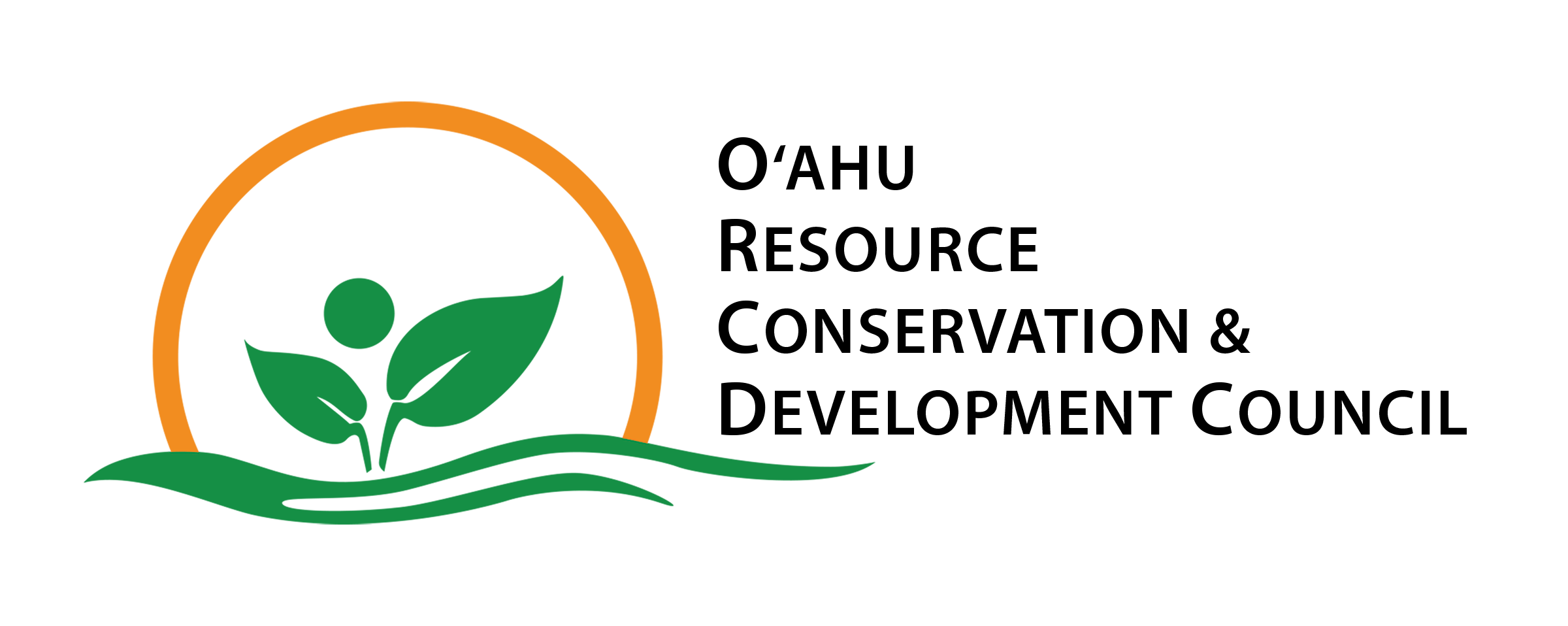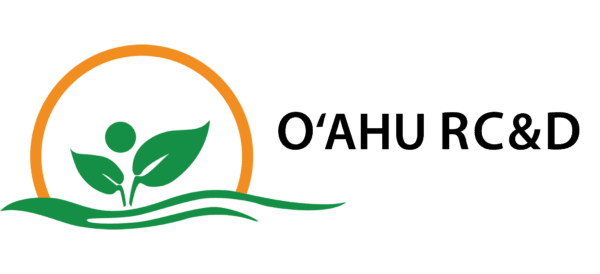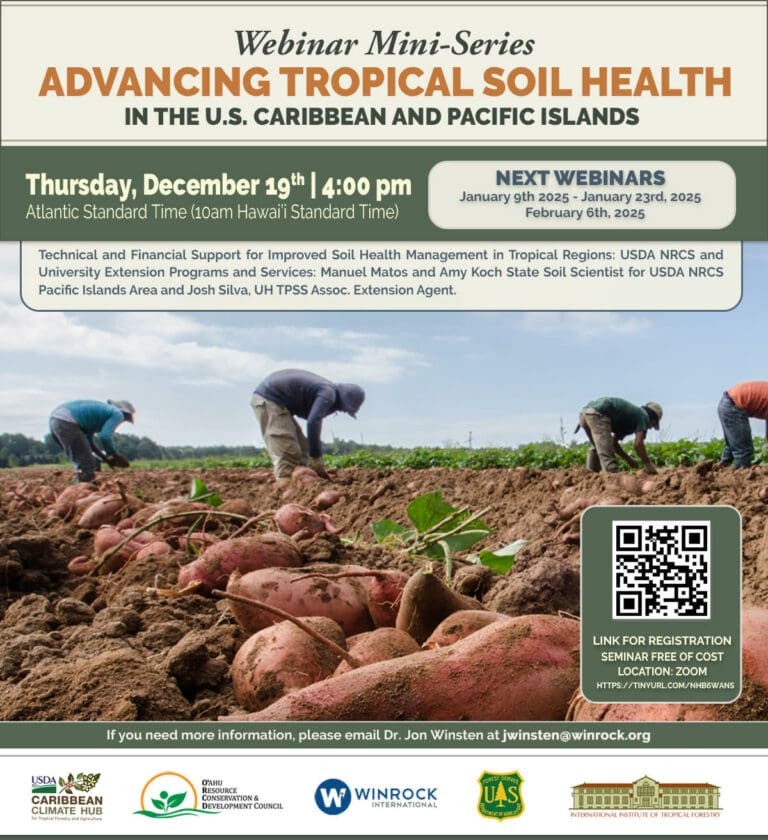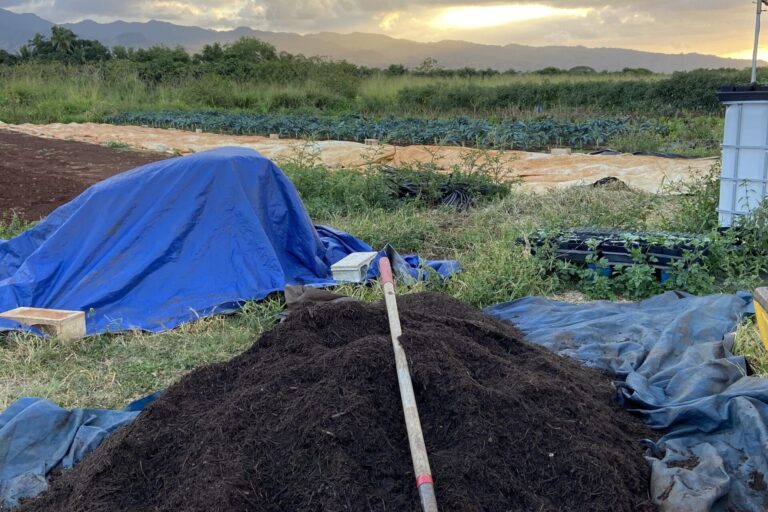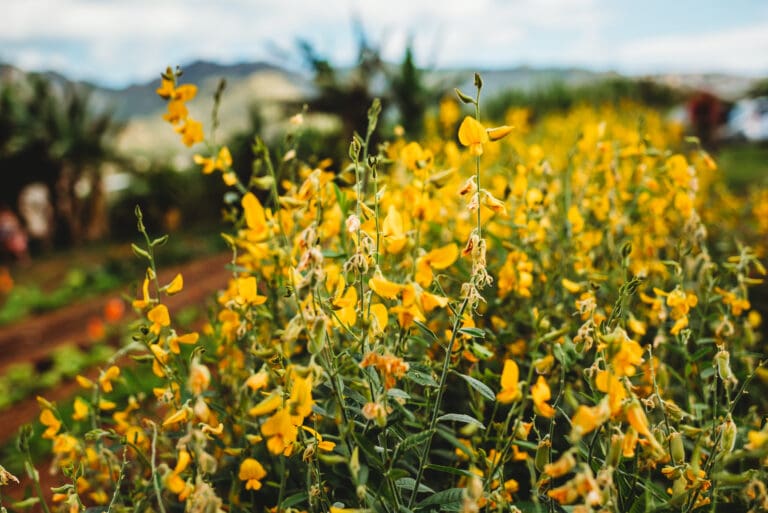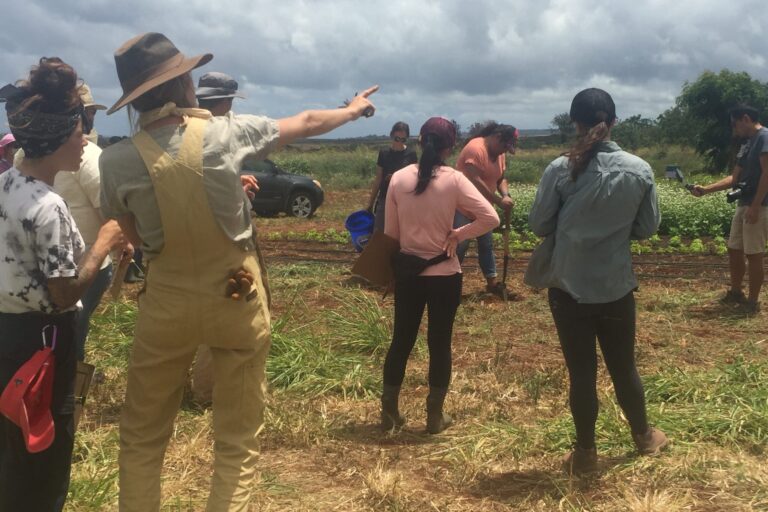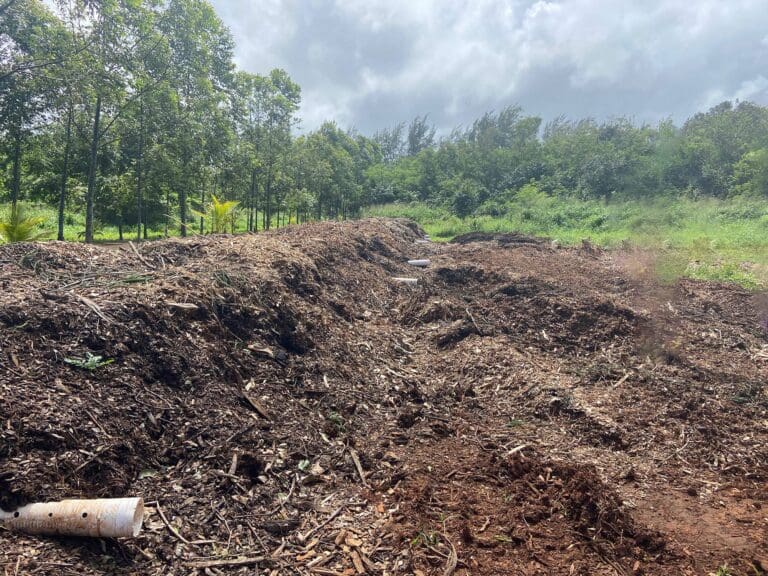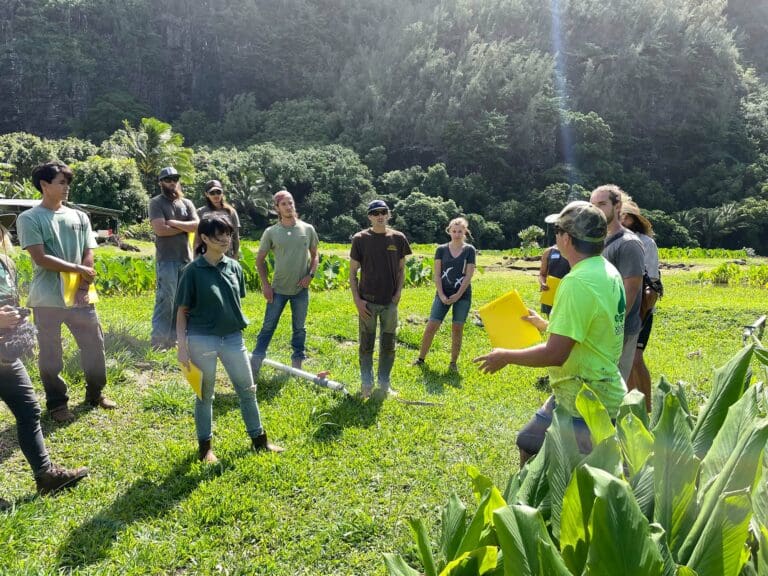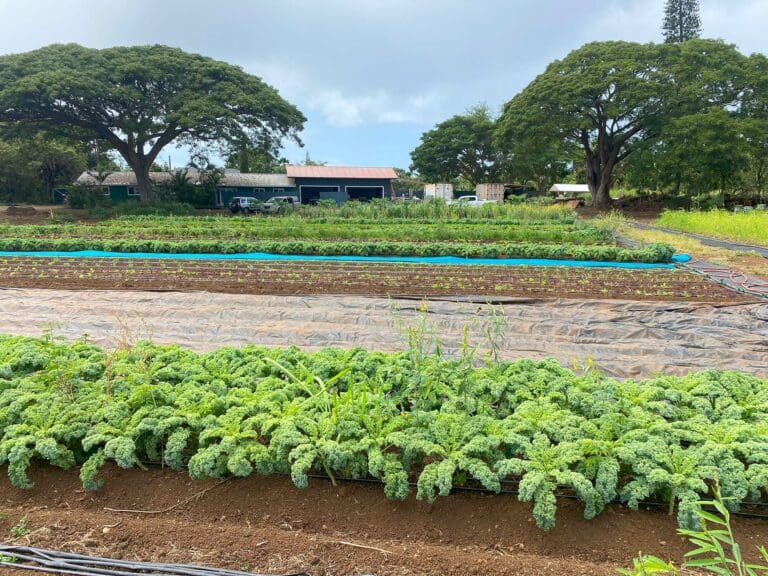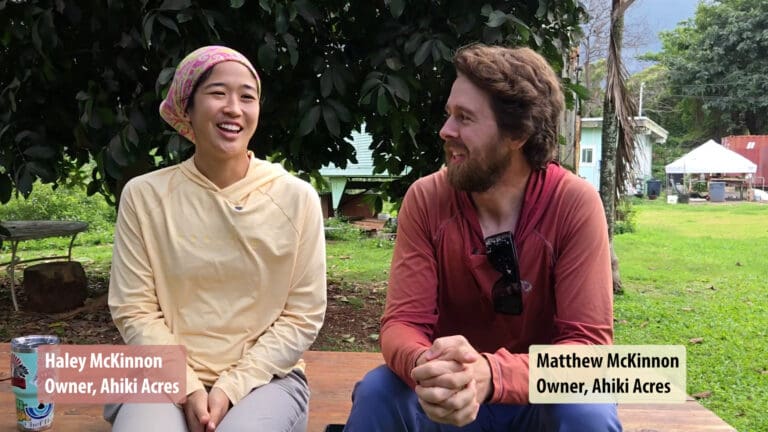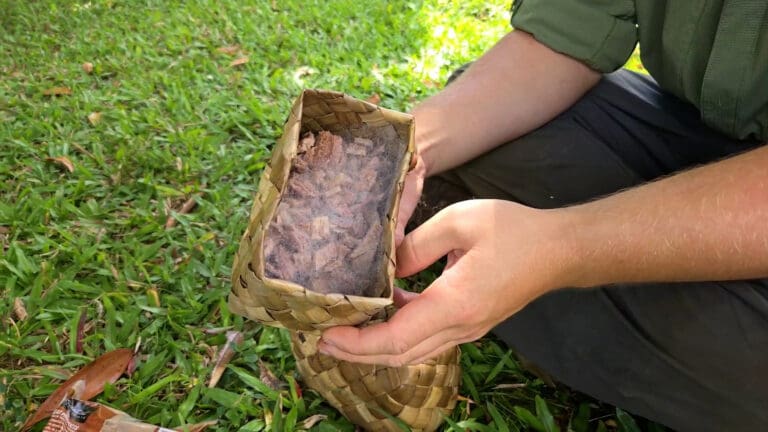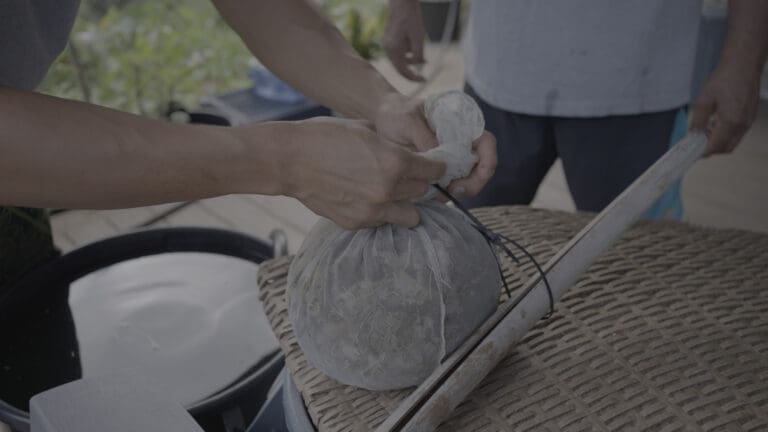Soil Health Farmer Training Program
About the Farmer Soil Health Program
The Hawaiʻi Soil Health Network (HSHN) was formed to continue the project entitled: Accelerating the Adoption of Soil Health Practices by Farms in Hawai’i through Cohort-based Training which was funded through a cooperative agreement between the USDA Natural Resource Conservation Service Pacific Islands Area (NRCS PIA) and Oʻahu RC&D. The curriculum and resources developed through this program are now available to the general public and include videos and materials recorded during in-person and online workshops held from 2022-2024 with producers on Oʻahu, Kauaʻi, Maui and Hawaiʻi Island, along with both local and national researchers, technical advisors, extension agents and the University of Hawaiʻi S(HEE)R – Soil Health Environment and Ecosystem Resilience Lab.
The HSHN extends to growers on all islands and is intended to share resources, skills, and inspiration to help make soil health monitoring and management more accessible, easy and affordable. The courses are organized by the steps of the soil health planning process, starting with foundational courses, followed by courses on how to routinely test and assess indicators for soil health, develop on-farm trials of various soil health practices, and a strategy for integrating selected practices into a comprehensive management system. Features on local Soil Health Innovators are intended to provide a source of inspiration while sharing technical information on some of the soil health practices and systems that are being used successfully by local farmers across the islands.
Soil Health Course Sessions
Advancing Tropical Soil Health In The U.S. Caribbean and Pacific Islands, Webinar Mini-Series
This webinar mini-series is designed to create learning opportunities related to tropical soil health management in the U.S.
Session 1: Soil Health Foundations
Introduction to the foundations of soil health, focusing on how improved soil health can contribute to healthier and more productive crops. The overlap between soil health and soil fertility will be explained with a focus of how a farmer applies this knowledge in their operation.
Session 2: Resources for Observing, Monitoring & Increasing Understanding of On-Farm Soil Health
The purpose of this session is to work with farmers to share some of the ‘best available information’, tools, Native Hawaiian ‘ike, farm mentors, local service providers and researchers to support the observation and monitoring of on-farm soil health.
Session 3: Practices to Improve Soil Health & Soil Fertility
This session focuses on resources and practices local farmers and researchers are curently using to improve soil health and soil fertiilty.
Session 4: Soil Health Plans & Costing
This session demonstrates the process for developing a farm-level soil health plan.
Soil Health Training for Technical Service Providers
Qualified producers and agriculture professionals in Hawai’i can now become certified Technical Service Providers (TSPs) with the USDA Natural Resources Conservation Service (NRCS).
Features on Farmer Soil Health Practices
We’re excited to share technical features highlighting the innovative practices farmers are using across the island to restore on-farm ecological services through improved soil health and function. These features are intended to be shared as part of a Hawai’i Farmers Soil Health Network. The network was developed through a three year project organized and administered by Oahu RC&D through a cooperative agreement with the USDA Natural Resources Conservation Service (NRCS) Pacific Islands Area State Office. The effort included cohorts of farmers held on Oahu, Maui, Kauai, and Hawai’i Island with each tailored to the predominant soil types and based on the main management challenges associated with these soil types. Each cohort will include workshop sessions delivered over several months. The workshop series is designed to walk participants through the process of testing and identifying in-field indicators of soil health, setting soil health goals, identifying management practices that can help reach these goals, and integrating these practices into their farm design and operations. The training sessions include a viability model and system for routinely measuring improvements over time. Farmers participating in the cohorts worked closely with the UH Soil Health Environment and Ecosystem Resilience Lab, S(HEE)R Lab to assess indicators of soil health on their farm and develop systems for measuring improvements over time. Working with local experts and each other, farmers in the network explored ways to hone existing practices and develop cost-effective alternatives for managing organic matter levels, soil aggregate structure, compaction and soil organism habitat. These practices are contributing to a growing body of knowledge about practices relevant to Hawaii.
Soil Health Practices
Soil Health Practice Videos
We are honored to compile this suite of videos, featuring mahiʻai who have been actively involved in preserving and sharing indigenous farming practices to encourage a healthier food system and ecosystem in their communities. These videos are intended to serve as a source of inspiration and to share practical, technical information on the practices used by farmers across the islands to regenerate, remediate and build soil. The videos are also intended to be shared as part of farmer-to-farmer learning networks and to spark conversation on the importance of bringing Native Hawaiian and Pacific Island voices and indigenous agricultural practices to the forefront of the regenerative agriculture movement in Hawaiʻi today.
This video production was made possible through participation from the Hawaiʻi Farmers Union (HFU), Cho Global Natural Farming (CGNF), Hawaiian Indigenous Natural Farming and the Hawai’i Farmers Soil Health Network. The project was funded through the generous support of a Atherton Family Foundation Grant.
Stay tuned to view upcoming videos and features of the practices being used across the islands in a range of operations, from diversified market gardens to orchard and agroforestry systems by visiting Oʻahu RC&Dʻs YouTube channel and Oʻahu RC&Dʻs Farmer Training and Resource Site.
The suite of videos include:
- “Using Natural Farming Methods to Fertilize and Manage Crop Pests at the Hawai’i ‘Ulu Cooperative Agroforestry Demonstration Plot at OK Farms (Hilo, Hawai’i Island) with Vi Girbino Agroforestry & Bioremediation Technician with OK Farms and Seth Jones and Evan Kamber with Pono Grown
- “Soil Health Practices to Prepare and Better Manage your Farm with Ahiki Acres” with Matthew and Haley McKinnon, owners and operator of Ahiki Acres.
- “Hawaiʻi Natural Farming Methods for Making Your Own Soil Amendments andFertilizers” with Alika Atay with the Choʻs Global Natural Farming (CGNF).
Featured in the videos:
- Kaipo Kekona, HFU President, Board Member of the Lahaina Community Land Trust and Manager of the Ku’ia Agricultural Education Center, in the ahupua’a of Ku’ia on Legacy Lands of Keʻelikolani,
- Alika Atay, Founder of the Hawaiian Indigenous Natural Agriculture (HINA) andFormer Maui County Council Member and Certified Natural Farming Teacher with HFUʻs Farm Apprentice Mentoring (FAM) Program;
- Kuʻuipo Garrido and Stephen Bolson, Owners/Operators of Nā Mea Kūpono Learning Center
- Alika, Kuʻuipo and Stephen work together to carry-on Master Choʻs teachings through the Cho Global Natural Farming (CGNF)
